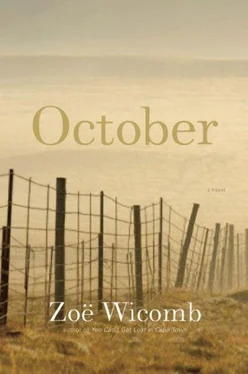Yes, that is the association Mercia remembers, Macau as a place where Camões sojourned. If she is not mistaken, The Lusiads , or part of it, was written there. Wouldn’t it be wonderful, she says, if Macau were the place where old Adamastor was born. He, the monster of the coarse gravelly voice, who finds himself hugging a hillside, cheek to cheek with a boulder, instead of the beloved who mocks him from the waves. As for Adamastor’s grave, proprietorial warnings to explorers that so exercise South Africans, she doesn’t care. Nothing to do with her and her kind.
Aye right, hen, dinnae worry about your monster, mocks Smithy. I know plenty of real men hugging a hillside after the honeymoon. Nothing to do with unrequited love either, just the old story of being blinded by sex rather than thinking about a flesh-and-blood woman, another human being.
Already Macau sounds cozily familiar. Adamastor — let’s say he was actually born in Macau, Mercia muses, a seed sprung in the mind of the one-eyed Camões, the poet in exile. I can just see him grumpily brooding in his grotto, an alien on a Chinese peninsula without a guidebook to facilitate interaction, one who transforms his monster into Table Mountain, towering over the Cape Peninsula. It would be like a homecoming for me. Of course it didn’t occur to the poet that the Khoe who lived there had a different story for their own sea mountain, Hoerikwaggo as they had already named it.
No kidding, Smithy says, Professor, the job is yours. Adamastor must be recast right there in the place of his birth.
Yes, no kidding, and who knows what forebears of mine might hail from Macau, famous for its slave trade, Mercia jests. Who knows what happened to the children born to Camões’s Chinese concubines?
And so she talks herself into it. She ought to stay put and deal with selling the flat; besides, she doesn’t really dislike her job, but Macau does seem awfully tempting. Even providential, given that she has already decided to leave the West End.
But a flat, darling, says Smithy, is not the same as a city, or a country.
Mercia has spent a sleepless night, was up at dawn, and now before the interview has plenty of time to wander about the campus on Taipa with its assortment of buildings perched on a hill, modernist structures at various levels that, thanks to ingenious gardening, appear to grow out of the rock formations. She is grateful for her infallible sense of direction, since the place is a challenge, with floors numbered differently in buildings connected by walkways. These she explores, fascinated by the flora of Macau, which is everywhere on display. Gardens tumble out of rock faces, are exquisitely laid out on roofs, transform embankments, provide ornamental edging to the facades of stonework, are tucked between buildings, turning awkward spaces into lush displays. And so many of the flowers are those of the Cape: bougainvillea, hibiscus, poinsettia, oleander. Perhaps even jacaranda, which, like the frangipani she does recognize, is not in flower.
She finds on the northern side a bench on the fifth floor, or is it the second? from which to look out at the spectacular view of hazy sunlight on the water, the long bridge connecting Taipa island to Macau, and the hills flanking the city’s glitzy casinos, from which light bounces. Mercia does not know what to think of living in a place like this. She ought to consider the possibility of a question about why she wants to come to Macau. She could not very well say that “Facilitating Interactions” has driven her there. And who’s to say that Health and Safety and Personal Development Advice are not in any case already hiking their way over to China? Instead, will she say something limp about the weather, the heat, the flowers of the Cape? By virtue of being interviewed, there is a chance of being offered the job, so what in the world would she do if it were offered to her? She has no idea, but no doubt she’ll soon find out.
Mercia’s head spins. She has twenty more minutes. She rises distractedly, wanders down a flight of stairs, and catches a glimpse of morning glory tumbling over rocks. And so late in the year too, although the weather at the beginning of November is deliciously hot, hardly autumnal. A flash of blue trumpets lures her along a corridor that promises a hidden garden, until she realizes that she has lost her bearings, has lost the garden. If only she could get out into the open, out of this building, she would be able to find her way. And indeed, just before panic sets in, Mercia sees in the dark low-ceilinged corridor ahead natural light pouring in from a structure on her left. It is a turtle pond, situated both indoors and out, its far wall an ornamental stone structure of various levels, supporting another roof garden.
On that far bank of the pond in the morning sun the creatures are huddled together, haphazardly piled up on top of each other, as if there were not enough space, as if they have been hurriedly driven out of the water. Some are settled on a large concrete fish. Rising out of the water are two ghostly concrete structures, resembling mountains in old Chinese paintings, and on these are placed, in various crags, little figurines. As she squints to see what they represent, several turtles splash noisily into the water, as if they have just woken up. Mercia watches the ancient-looking creatures lumber in and out of the pond. She checks her watch. There is time, and although she is not sure of her whereabouts, the campus is small, and the garden on the right means that she’ll get out, find her way once again.
She is drawn to the strange movements of a small turtle with yellow markings on its shell, the markings, she assumes, of youth. It swims in circles, apparently trying to gain the attention of a large, older turtle that clumsily turns away and moves off, only to find itself repeatedly confronted by the youth. With its left flipper it swipes in irritation at the stalker, whilst steering itself away. But the young turtle persists until it manages to face the elder squarely. It reaches out with its flippers — how like little hands they are, the bones between the webbing raised like fingers — as if to touch the face of the other, the splayed fingers quivering with excitement as they slowly shiver forward, but before they touch, the older turtle turns away, evidently repelled, and hurriedly makes off.
Mercia leans over to inspect more closely. The young one does not give up. It describes wide arcs around its quarry, then homes in. It earns a few clips around the ear, is rudely rebuffed, given the cold shoulder, but when the older turtle is lulled into dropping its guard the younger slips round and deftly confronts it once more, face-to-face. The prehistoric head turns away in distaste, and as its pursuer moves round to capture the eyes, the exasperated creature lifts its head out of the water. Give me a break, it seems to cry; give me space to breathe, but when the head drops back into the water the little face is right there, looking into the elder’s eyes, supplicating. There is language in the movement of those fingers, shivering with passion, as they reach out to touch the face of the other.
I am here! Please, oh please. It is I!
That is what it seems to say. The trembling digits are about to make contact when the older creature swipes at them, cruelly lashes out, then plunges deep into the water and manages to get away.
Phew, what a performance. What could the little chap be pleading for? What does it want? Perhaps, unlike its land cousin, the tortoise, who can walk away from its eggs, this lot left against nature in the same pond, thrown together in the same waters as their parents, will not be abandoned. Will keep on circling the elder in abject supplication. Will stutter through those quivering hands, Acknowledge me, it is I I I I. .
Читать дальше












